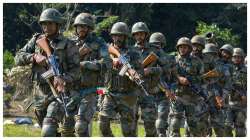Lok Sabha passes Inter-Services Organisation Bill, 2023 | Know about the bill and its main features
The bill seeks to empower Commander-in-Chief and Officer-in Command of Inter-Services Organisations (ISOs) with all disciplinary and administrative powers in respect of the personnel serving in or attached to such organisations.

The Lok Sabha on Friday (August 4) passed the Inter-Services Organisation (Command, Control & Discipline) Bill, 2023. The bill was tabled in the House by Defence Minister Rajnath Singh. The bill seeks to empower the commander-in-chief and officer-in-command of inter-services organisations with disciplinary and administrative powers over personnel from other forces serving in such establishments.
Introducing the Bill for consideration and passage, Defence Minister Singh termed it as part of a series of military reforms being undertaken by the Government, led by Prime Minister Narendra Modi, with the aim to empower the nation. He described the bill as an important step taken towards integration and jointness among the Armed Forces to face future challenges in an integrated manner.
Currently, the Armed Forces personnel are governed in accordance with the provisions contained in their specific Service Acts - Army Act 1950, Navy Act 1957 and Air Force Act 1950.
Benefits of the bill
The enactment of the Bill will have various tangible benefits such as the maintenance of effective discipline in inter-services establishments by the Heads of ISOs, no requirement of reverting personnel under disciplinary proceedings to their parent Service units, expeditious disposal of cases of misdemeanour or indiscipline and saving of public money and time by avoiding multiple proceedings.
The Bill would also pave the way for much greater integration and jointness amongst the three Services; lay a strong foundation for the creation of Joint Structures in times to come and further improve the functioning of the Armed Forces.
Highlights of the Bill
- The ‘ISO Bill - 2023’ will be applicable to all personnel of the regular Army, Navy, and Air Force, and to persons of other forces as notified by the Central Government, who are serving in or attached to an Inter-Services Organisation.
- This Bill empowers the Commander-in-Chief, Officer-in-Command or any other officer specially empowered in this behalf by the Central Government with all the disciplinary and administrative powers in respect of personnel serving in or attached to their Inter-Services Organisations for the maintenance of discipline and proper discharge of their duties, irrespective of the service to which they belong.
- The Commander-in-Chief or the Officer-in-Command means General Officer/Flag Officer/Air Officer who has been appointed as Commander-in-Chief of Officer-in-Command an Inter-Services Organisation.
- To maintain Command and Control in the absence of the Commander-in-Chief or the Officer-in-Command, the officiating incumbent or the officer on whom the command develops in the absence of a C-in-C or Oi/C, will also be empowered to initiate all disciplinary or administrative actions over the service personnel, appointed, deputed, posted or attached to an Inter-Services organisation.
- The Bill also empowers the Commanding Officer of an Inter-Services organisation to initiate all disciplinary or administrative actions over the personnel appointed, deputed, posted or attached to that Inter-Services Organisation. For the purpose of this Act, Commanding Officer means the officer in actual command of the unit, ship or establishment.
- The Bill empowers the Central Government to constitute an Inter-Services Organisation.
The ‘ISO Bill-2023’ is essentially an Enabling Act and it does not propose any change in the existing Service Acts/Rules/Regulations which are time-tested and have withstood judicial scrutiny over the last six decades or more. Service personnel when serving in or attached to an Inter-Services Organisation will continue to be governed by their respective Service Acts. What it does is to empower Heads of Inter-Services Organisations to exercise all the disciplinary and administrative powers as per the existing Service Acts/Rules/Regulations, irrespective of the service they belong to.

